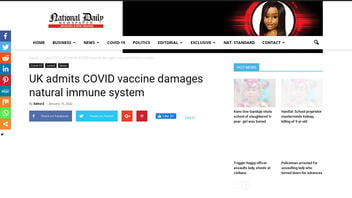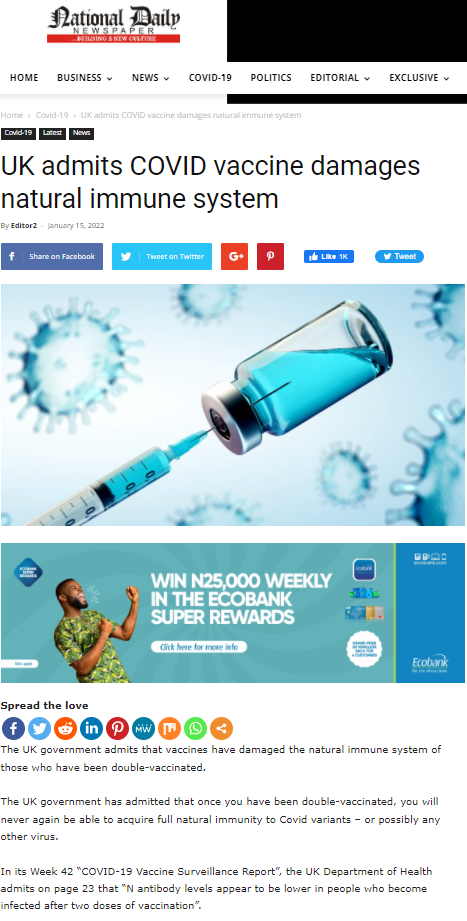
Did the United Kingdom admit the COVID-19 vaccine damages the natural immune system? No, that's not true: The claim in the National Daily Newspaper misconstrues information in the COVID-19 vaccine surveillance report - Week 42 by the UK Health Security Agency published on October 21, 2021. The report doesn't suggest the immune system is compromised by the COVID vaccine and can't recover from the damage, as the National Daily Newspaper article claims. Instead, the government report says that following vaccination, the immune system produces less of one type of antibody and more of another.
The claim appeared in an article (archived here) published by the National Daily Newspaper on January 15, 2022, titled "UK admits COVID vaccine damages natural immune system," which opened:
The UK government admits that vaccines have damaged the natural immune system of those who have been double-vaccinated.
The UK government has admitted that once you have been double-vaccinated, you will never again be able to acquire full natural immunity to Covid variants - or possibly any other virus.
This is what the article looked like on January 15, 2022:
(Source: National Daily News screenshot taken on Fri Jan 21 22:04:19 2022 UTC)
The National Daily Newspaper claim is based on this passage in the vaccine surveillance report (Page 23):
... N antibody levels appear to be lower in individuals who acquire infection following 2 doses of vaccination.
To understand what this means, you have to know what an N antibody is. Also known as Roche N, it is the measure of post-infection antibodies, meaning the antibodies generated after someone recovers from a disease. In this case, COVID. The antibodies generated by the immune system after vaccination are different than those from natural immunity and are called S antibodies, or Roche S. The UK vaccine surveillance report defines it this way:
Nucleoprotein (Roche N) assays only detect post-infection antibodies, whereas spike (Roche S) assays will detect both post-infection antibodies and vaccine-induced antibodies. Thus, changes in seropositivity for the Roche N assay reflect the effect of natural infection. Increases in seropositivity as measured by S antibody reflect both infection and vaccination.
So, it would be normal for vaccinated people, who haven't had COVID before, to have lower N antibodies, which come from natural immunity and infection by the virus. It's not the result of an immune system damaged by the COVID vaccine.
The Centers for Disease Control and Prevention recommends a COVID vaccine even for those who have the virus. According to Nebraska Medicine, you shouldn't skip the shot if you've already been sick:
The data is clear: Natural immunity is not better. The COVID-19 vaccines create more effective and longer-lasting immunity than natural immunity from infection.
- More than a third of COVID-19 infections result in zero protective antibodies
- Natural immunity fades faster than vaccine immunity
- Natural immunity alone is less than half as effective than natural immunity plus vaccination
The takeaway: Get vaccinated, even if you've had COVID-19. Vaccine immunity is stronger than natural immunity.
'Natural immunity can be spotty. Some people can react vigorously and get a great antibody response. Other people don't get such a great response,' says infectious diseases expert Mark Rupp, MD. 'Clearly, vaccine-induced immunity is more standardized and can be longer-lasting.'


















